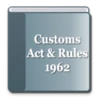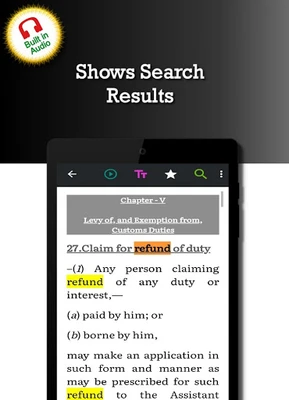
Customs Act 1962 & Rules
- 5.0 RATINGS
- 28.00MB DOWNLOADS
- 4+ AGE
About this app
-
Name Customs Act 1962 & Rules
-
Category COMICS & BOOK READERS
-
Price Free
-
Safety 100% Safe
-
Version 5.41
-
Update Nov 04,2024



In the ever-evolving landscape of international trade, the Customs Act 1962 and its accompanying Rules have stood as the cornerstone of regulating cross-border movements of goods and ensuring compliance with national and international regulations. However, with the advent of digitalization and technological advancements, traditional methods of managing customs procedures have become increasingly inefficient and cumbersome. Recognizing this need for modernization, the integration of digital apps tailored to the Customs Act 1962 & Rules has emerged as a game-changer.
These customs-focused apps represent a significant leap forward in streamlining the complex customs clearance process, enhancing transparency, and fostering a more efficient trade environment. By leveraging mobile technology, cloud computing, and big data analytics, these applications empower businesses, customs officials, and other stakeholders to navigate the intricate web of customs regulations with ease and precision.
Empowering Businesses with Seamless Compliance
For importers and exporters, apps designed around the Customs Act 1962 & Rules provide a one-stop-shop for all customs-related requirements. From pre-arrival declarations and duty calculations to tracking shipments and receiving real-time notifications on clearance status, these apps significantly reduce paperwork, minimize errors, and accelerate time-to-market. They also offer comprehensive guides and FAQs to help businesses stay informed about the latest customs regulations, ensuring seamless compliance and avoiding costly penalties.
Enhancing Efficiency for Customs Officials
On the other hand, customs administrations benefit immensely from these digital tools. By automating routine tasks such as data entry, document verification, and risk assessment, customs officials can allocate more resources towards higher-value activities like intelligence gathering, enforcement, and customer service. The apps facilitate seamless data sharing between government agencies, enabling joint operations and enhanced border security. Additionally, they provide real-time analytics and reporting capabilities, empowering officials to make informed decisions and optimize resource allocation.
Promoting Transparency and Trust
Another crucial aspect of these customs-focused apps is their role in fostering transparency and trust within the trade ecosystem. By making customs procedures more accessible and understandable, businesses can better anticipate costs and timelines, enhancing their competitiveness. Meanwhile, the public can access information on customs regulations, tariffs, and restrictions, fostering a culture of compliance and reducing the risk of misunderstandings or disputes. This, in turn, strengthens the relationship between governments, businesses, and consumers.
Adapting to the Future of Trade
As global trade continues to evolve, with the rise of e-commerce, digital trade agreements, and the push for sustainable supply chains, the Customs Act 1962 & Rules must adapt to stay relevant. By incorporating innovative technologies like blockchain, artificial intelligence, and the Internet of Things into their apps, customs administrations can stay ahead of the curve, ensuring that their systems are agile, secure, and capable of addressing emerging challenges. These advancements will not only make customs procedures faster and more efficient but also contribute to the overall resilience and sustainability of the global trade system.
In conclusion, the integration of digital apps tailored to the Customs Act 1962 & Rules represents a vital step towards modernizing customs processes and fostering a more efficient, transparent, and trustworthy trade environment. As we navigate the complexities of international trade in the digital age, these apps serve as a testament to the power of innovation and technology in shaping the future of customs management.













